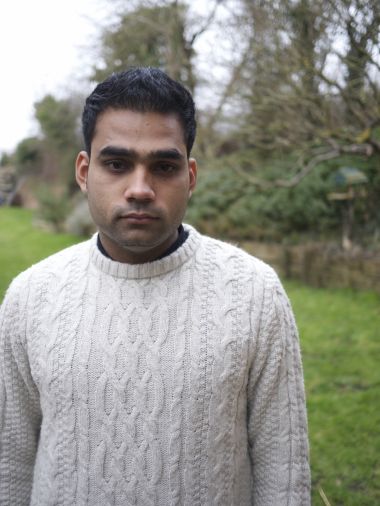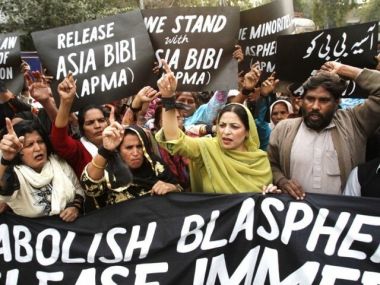Stabbed and left for dead by Islamist radicals: The cost of being a Christian in Pakistan

Ali Husnain was 17 when he was attacked and stabbed by members of a fundamentalist Islamic group in his hometown in Pakistan. A year earlier, he had converted to Christianity while visiting an aunt in England, having grown up in a prominent, wealthy Shia Muslim family. He'd kept his conversion quiet for 12 months; he had no Bible to read and couldn't go to church, but prayed relentlessly at night, and says he dreamt of Jesus many times. It kept him strong in his faith.
But then Ali talked about sin with some friends at school, and told them Jesus was the only who could offer true forgiveness. One of them told their father, a member of an Islamist group, and the next day Ali was attacked outside the school gates and left to die on the side of the road. "I remember being thrown to the ground and a man with a beard said: 'You tried to evangelise our children, now I'm going to kill you and you'll go to hell'," he told Christian Today. "Then he stabbed me, and I fell unconscious".
He was rushed to hospital, where doctors told his parents he had only 20 minutes to live. His lung had been punctured, causing significant internal bleeding, and there was no time to treat the wound.
But Ali, unconscious, says he had a vision of Jesus. "I dreamt that Jesus Christ came and healed me," he recalls. "He said, 'My son, your life is in danger just because of me. You will not die now; I will give you more life.'"
Ali woke up in hospital, still needing treatment but conscious, and aware of his surroundings. His doctors were astounded. When he recovered and was eventually allowed home however, it quickly became apparent that the repercussions of his conversion were not yet over. Given his family's prominence, it was all over the news, and media were waiting outside the hospital. His mother begged him to tell them that he'd made it up as a practical joke, but Ali refused. "I said I cannot do anything. The doctor said he could not save me, but Jesus Christ came and saved my life, and gave me a new life, and it belongs to him. I cannot deny him."
Christianity is a minority religion in Pakistan, where at least 95 per cent of the population is Muslim. The US Commission for International Religious Freedom last year said the country represented "one of the worst situations in the world for religious freedom" and accused the Pakistani government of failing to provide adequate protections for faiths other than Islam. Repressive blasphemy laws are used to target religious minorities, and sectarian violence is considered a chronic problem.

The Movement for Solidarity and Peace in Pakistan estimates that hundreds of young Christian and Hindu women and girls are forced to convert to Islam and to marry Muslim men every year, and though conversion to Christianity is not prohibited, those who choose to do so often face extreme pressure to recant their new faith.
Ali's refusal to distance himself from Christianity angered the fundamentalists in his town further. "That evening we had people visiting the house and threatening my family, saying they would burn down our house," Ali says. He ran away to a different city where he stayed with relatives, but then that house was attacked, and his aunt was injured and killed. "It was because of which family I came from... people were very angry," he says.
His family, too, were upset, and though they were willing to help him escape from those who wanted him dead, they "rejected me and my faith," Ali says. "My mum said, 'You have to leave Pakistan. You cannot belong to us any more.'" His parents bought him a one-way ticket to England, promising to join him as soon as they got visas. That was 2007, and the last time he saw them.
Ali credits his faith with helping him to keep going, despite leaving everything he knew behind. "It was the power of the Holy Spirit," he says. "For me, it was a very strong testimony when I nearly died and Jesus Christ came and saved me. He gave me hope that kept me going. I was also young, and didn't realise [my conversion] would cause this big issue. I trusted my family to help me, but when they didn't give me support, the support from God was very strong. Having experienced him and met him in dreams, I knew he would protect me, and knew he would make something good out of it."
Now in England and living with his aunt, it took Ali six years to be granted asylum, on the grounds that if he returns to Pakistan he will be killed. A few years ago, a fatwa was issued against him by radicals in his hometown. "It says if I go back to Pakistan or if anyone sees me there, they can kill me and won't be punished."
But despite this, Ali has plans to return in the next few years. Now 24 years old, he wants to build a medical facility in the town where he grew up to bless the community that turned against him.
"I want to go back and bless my city," he explains. "I had to leave my family, and they [the fundamentalists] took everything away from me, but I want to go back and show that my God is bigger than theirs, and say he has forgiven me, so I want to forgive you.
"I want to show them what a real man of Christ looks like, and what Christianity truly is... I know my life is in danger, but God has saved me so far. If he wants me in Pakistan he will save me there."
The medical facility will offer services to those in poverty, which Ali hopes will speak of God's grace and kindness. "I want to bless the poor and give something back to the community and say 'God still loves you, I still love you'. The Bible is all about love, which is far greater than hate, and if I don't go back who will? If I wont preach the gospel to my own family, and my own people, who will?"
Ali has co-written a book about his experiences. 'The Cost' is published by Zondervan, and available now.
Names have been changed for security reasons











